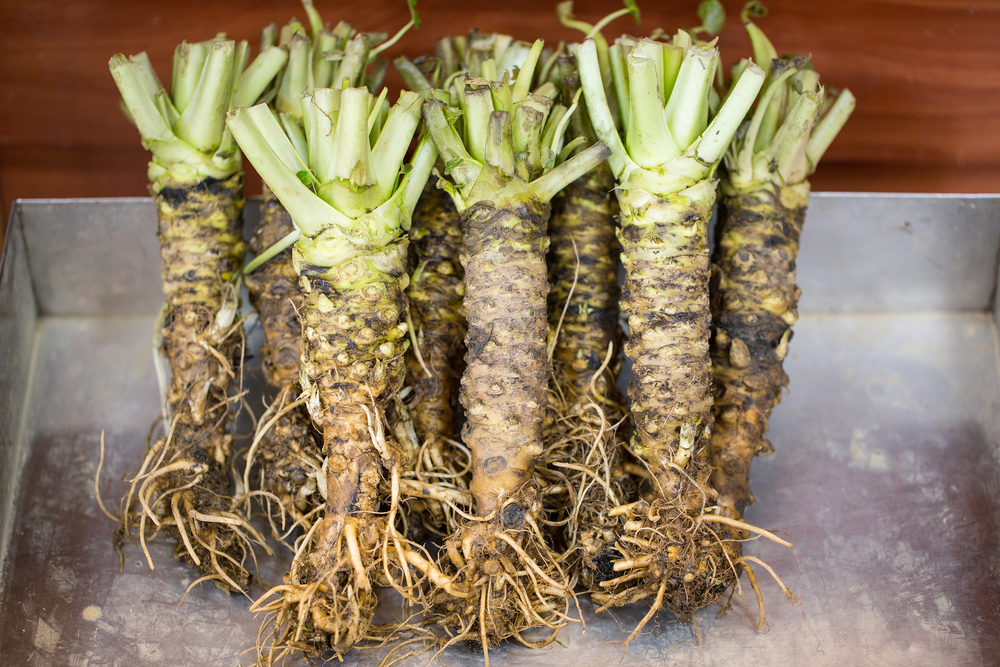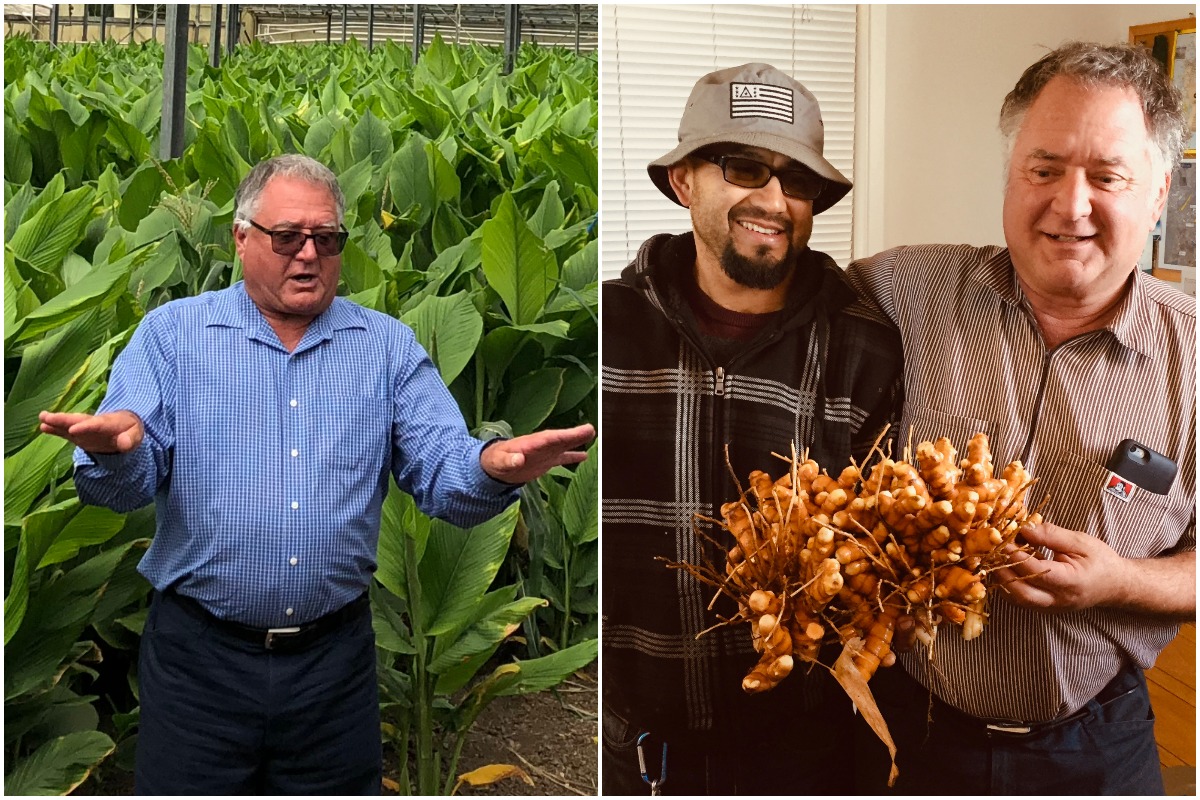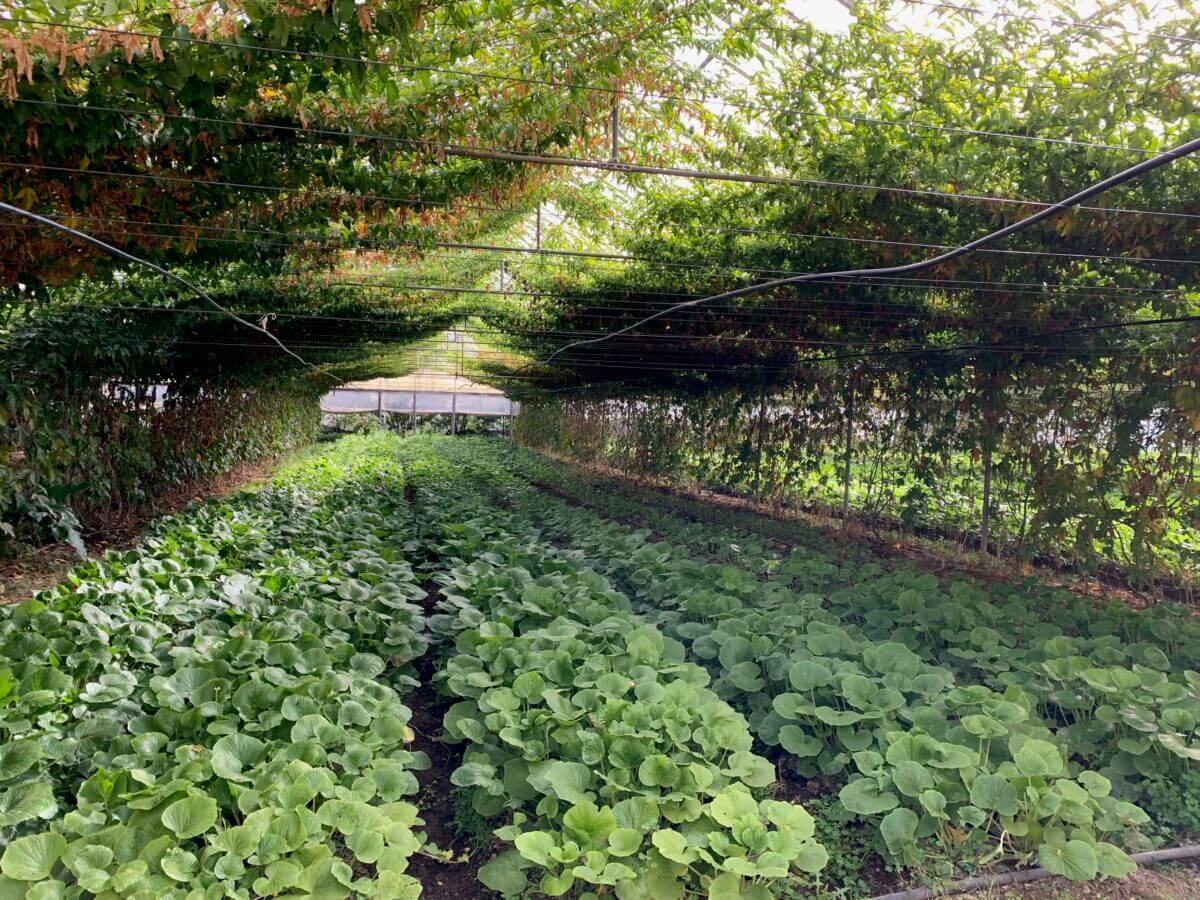Meet the California Farmer Taking a Chance on Domestic Wasabi
With climate change threatening supplies of Japanese wasabi, farmers like David Blume are planting new opportunities for the crop.
Meet the California Farmer Taking a Chance on Domestic Wasabi
With climate change threatening supplies of Japanese wasabi, farmers like David Blume are planting new opportunities for the crop.

Fresh wasabi, often called the hardest crop in the world to grow.by ShutterOK, Shutterstock.
David Blume isn’t just a farmer. He’s an artist, author, teacher and a self-described mad scientist. The “farmer in chief” of Whiskey Hill Farms in Watsonville, California has made a concerted effort to keep learning throughout his life and to always chase adventure. “You can get into a rut with farming,” Blume says.
To ensure that doesn’t happen, he’s never gravitated toward growing commodity crops like corn, soybeans or barley, instead favoring specialty crops such as turmeric, lemon cucumbers and galangal. But that comes with its own risks. “Every time you plant a crop, you are literally betting the farm. If you have a crop failure, it’s gone. Your whole farm,” says Blume. “We farmers can be thought of as high-stakes gamblers.”
On his 14-acre organic farm, Blume focuses on poly cropping, the concept of growing two or more crops at one time to harvest, introducing regenerative and permaculture practices while still prioritizing that ethos of adventure. Greenhouses cover eight of those acres. He’s devoted part of one greenhouse to tropical conditions, growing 200 different fruits in what’s become a mini-rainforest. He’s even added taller trees and plants to provide natural shade rather than relying on shade cloth over the greenhouse itself. This helps to mimic the ecological regions of his plants. Another greenhouse is dedicated to sugary and starchy plants in various stages of fermentation, which later get distilled into alcohol. He also raises algae to feed the fish and lobsters in ponds along the farm. The byproduct of each process in turn serves another function on the farm, like using water fertilized from the fish to irrigate crops.

One of mad scientist’s more successful recent plantings is wasabi, which he researched extensively before testing it out on the farm last February. “It’s often called the hardest crop in the world to grow,” says Blume, who wasn’t deterred by that fact. “When I heard that, man, I just had to try it.”
Blume grows Mazuma, one of the four main cultivars of wasabi. In Japan, no variety of wasabi is as revered as Mazuma, grown for its enlarged rhizome and prized for its intense flavor and creamy texture. But most Americans never get the chance to experience the real deal.
According to the Washington Post, up to 99 percent of all wasabi in North America is fake. The little ball of green paste in your bento box or in the package that accompanies your takeout sushi is almost certainly not wasabi. It’s often horseradish mixed with food coloring and occasionally a touch of the real stuff. Actual wasabi is less spicy, with a herbaceous heat that fades quickly, and is often grated fresh at the counter by a traditional sushi chef.

Japan’s wasabi harvest has declined by close to 55 percent over the last decade, owing to a combination of environmental factors and the innate challenges that come with growing it. Climate change has brought on rising temperatures, which leads to increased risk of fungal disease and pests. Extreme weather events like typhoons and extreme flooding have ruined wasabi fields.
With a wasabi crisis brewing in Japan, growers in other countries are stepping in to fill the void. A handful of farmers like Blume are taking a crack at cultivating the crop stateside, giving Americans the chance to get a taste of local wasabi. But it’s a finicky plant to grow just right. It can take up to 36 months to be ready for harvesting, “which means you have a long period when things can go wrong. Diseases or bugs,” Blume explains. “You have to have a pretty good system to control all that without it being overwhelming.”
Because it’s so difficult to grow, Blume is able to fetch up to $150 per pound for fresh wasabi. And with a yield of approximately 20,000 pounds per acre, assuming everything works well, that’s a pretty great return on the time investment.
Although he’s in his 60’s now, Blume shows no sign of slowing down. “[Farming] is such a diverse set of skills that you acquire over time. You can’t beat it. You’re never bored being a farmer,” he says. “You might be stressed, you might be anxious, you might not have money at times, but you’re never bored. And mad scientists never want to be bored.”
Follow us
This work is licensed under a Creative Commons Attribution-NoDerivatives 4.0 International License.
Want to republish a Modern Farmer story?
We are happy for Modern Farmer stories to be shared, and encourage you to republish our articles for your audience. When doing so, we ask that you follow these guidelines:
Please credit us and our writers
For the author byline, please use “Author Name, Modern Farmer.” At the top of our stories, if on the web, please include this text and link: “This story was originally published by Modern Farmer.”
Please make sure to include a link back to either our home page or the article URL.
At the bottom of the story, please include the following text:
“Modern Farmer is a nonprofit initiative dedicated to raising awareness and catalyzing action at the intersection of food, agriculture, and society. Read more at <link>Modern Farmer</link>.”
Use our widget
We’d like to be able to track our stories, so we ask that if you republish our content, you do so using our widget (located on the left hand side of the article). The HTML code has a built-in tracker that tells us the data and domain where the story was published, as well as view counts.
Check the image requirements
It’s your responsibility to confirm you're licensed to republish images in our articles. Some images, such as those from commercial providers, don't allow their images to be republished without permission or payment. Copyright terms are generally listed in the image caption and attribution. You are welcome to omit our images or substitute with your own. Charts and interactive graphics follow the same rules.
Don’t change too much. Or, ask us first.
Articles must be republished in their entirety. It’s okay to change references to time (“today” to “yesterday”) or location (“Iowa City, IA” to “here”). But please keep everything else the same.
If you feel strongly that a more material edit needs to be made, get in touch with us at [email protected]. We’re happy to discuss it with the original author, but we must have prior approval for changes before publication.
Special cases
Extracts. You may run the first few lines or paragraphs of the article and then say: “Read the full article at Modern Farmer” with a link back to the original article.
Quotes. You may quote authors provided you include a link back to the article URL.
Translations. These require writer approval. To inquire about translation of a Modern Farmer article, contact us at [email protected]
Signed consent / copyright release forms. These are not required, provided you are following these guidelines.
Print. Articles can be republished in print under these same rules, with the exception that you do not need to include the links.
Tag us
When sharing the story on social media, please tag us using the following: - Twitter (@ModFarm) - Facebook (@ModernFarmerMedia) - Instagram (@modfarm)
Use our content respectfully
Modern Farmer is a nonprofit and as such we share our content for free and in good faith in order to reach new audiences. Respectfully,
No selling ads against our stories. It’s okay to put our stories on pages with ads.
Don’t republish our material wholesale, or automatically; you need to select stories to be republished individually.
You have no rights to sell, license, syndicate, or otherwise represent yourself as the authorized owner of our material to any third parties. This means that you cannot actively publish or submit our work for syndication to third party platforms or apps like Apple News or Google News. We understand that publishers cannot fully control when certain third parties automatically summarize or crawl content from publishers’ own sites.
Keep in touch
We want to hear from you if you love Modern Farmer content, have a collaboration idea, or anything else to share. As a nonprofit outlet, we work in service of our community and are always open to comments, feedback, and ideas. Contact us at [email protected].by Emily Baron Cadloff, Modern Farmer
April 9, 2022
Modern Farmer Weekly
Solutions Hub
Innovations, ideas and inspiration. Actionable solutions for a resilient food system.
ExploreExplore other topics
Share With Us
We want to hear from Modern Farmer readers who have thoughtful commentary, actionable solutions, or helpful ideas to share.
SubmitNecessary cookies are absolutely essential for the website to function properly. This category only includes cookies that ensures basic functionalities and security features of the website. These cookies do not store any personal information.
Any cookies that may not be particularly necessary for the website to function and are used specifically to collect user personal data via analytics, ads, other embedded contents are termed as non-necessary cookies.
Can one order some Wasabi from him online?
You’re so awesome! I don’t believe I have read a single thing like that before. So great to find someone with some original thoughts on this topic. Really.. thank you for starting this up. This website is something that is needed on the internet, someone with a little originality!